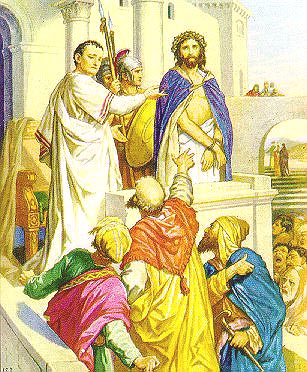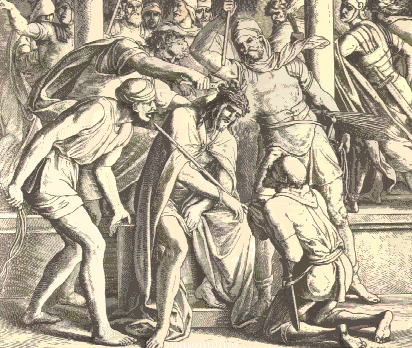| Jesus and
Barabbas
Very early in the morning, the chief priests,
with the elders, the teachers of the law and the whole Sanhedrin, reached
a decision. They bound Jesus, led him away and handed him over to Pilate...Now
it was the custom at the Feast to release a prisoner whom the people requested.
A man called Barabbas was in prison with the insurrectionists who had committed
murder in the uprising. The crowd came up and asked Pilate to do for them
what he usually did [release a prisoner]. "Do you want me to release to you
the king of the Jews?" asked Pilate…But the chief priests stirred up
the crowd to have Pilate release Barabbas instead. "What shall I do, then,
with the one you call the king of the Jews?" Pilate asked them. "Crucify
him!" they shouted. "Why? What crime has he committed?" asked Pilate.
But they shouted all the louder, "Crucify him!" Wanting to satisfy
the crowd, Pilate released Barabbas to them….And they began to call
out to [Jesus], "Hail, king of the Jews!"
Mark
15:1-18.
|
 |
Summary
| Odysseus and
Irus |
Jesus and
Barabbas |
| In Homer's work, the hero, Odysseus, watched
over by the goddess Athena, is believed by the crowd to be a common beggar.
Homer brings a real beggar, Irus, and Odysseus together. The real beggar
is the crowd favorite. The crowd encourages a contest between the real beggar
and the apparent one, and the apparent one wins. The crowd's leader hails
the victor, the hero Odysseus. |
In Mark's work, the hero, Jesus, watched over
by God, is believed by the crowd to be a common criminal. Mark brings
a real criminal, Barabbas, and Jesus together. The real criminal is the crowd
favorite. Pilate sets up a contest between the real criminal and the apparent
one, asking the crowd to choose which one should be released, and the real
criminal wins. The crowd hails the loser, the hero,
Jesus. |
Detailed Summary
| Parallels |
Odysseus and
Irus |
Jesus and
Barabbas |
| Readers know that the hero is empowered by
a god, while crowd is unaware of this. |
Odysseus is empowered
by a goddess; persons in crowd are unaware of this.
|
Jesus is empowered by a god; persons in crowd
asking for his crucifixion are unaware of this. |
| Crowd believes hero is something he's
not. |
Crowd
believes Odysseus is a common beggar. |
Crowd believes Jesus is a fraud, a common
criminal. |
| Author sets up a contest between two scoundrels,
one real, the other apparent. |
The apparent beggar fights the real
beggar. |
The apparent criminal competes with the real
criminal for the crowd's approval. |
| Crowd underestimates the power of the
hero. |
Crowd underestimates the power of
Odysseus. |
Crowd underestimates the power of
Jesus. |
| Author creates irony by having the crowd side
with the villain. |
Crowd sides with Irus, the real beggar, an
insolent braggart. |
Crowd sides with Barabbas, the real
criminal. |
| Author creates irony again, at the end
of the contest, by having crowd hail the person who will eventually rule
over and destroy them. |
The hero, Odysseus, wins, and his victory
is hailed, "Hail, father stranger." |
The hero, Jesus, loses, and his defeat is
mockingly hailed, "Hail, King of the Jews." |
Clues Signal Fictional Nature of
Gospel
 A
Play on Words A
Play on Words
As MacDonald points out, Mark provided an important
clue to his readers that his story was fictional which no one could miss:
he called the prisoner "Barabbas." Barabbas means "the
son of the father" 1. Thus, Mark has Pilate set up a contest between
two "sons of the father", one real, the other not. Of course, this unlikely
contest probably only took place in the creative imagination of Mark, who
wanted to create for his readers a parable teaching the goodness of Jesus
and the evilness of his persecutors.
 An Unlikely
Practice An Unlikely
Practice
MacDonald notes that there is no evidence independent
of Mark that it was ever the custom at feasts for the Romans to release a
prisoner requested by the Jews. Furthermore, such a practice would make no
sense, and would be quite foolish: it's not likely, for example, that
the Romans would release a prisoner accused of murdering soldiers. Thus,
this "practice" of releasing a prisoner probably existed only in the imagination
of Mark, who just needed to have two men to have a contest between one good
man and a bad one, similar to the one which occurred in Homer; Mark already
had the first man on the stage--Jesus, and through an artless contrivance
he brought on the second one.
 Hail! Hail!
MacDonald points to another strong indication
that Mark borrowed Homer's story to create the Jesus-Barabbas story. More
than 800 years before Mark, Homer put the word "Hail" in the mouths of the
crowd at the end of contest between Odysseus, the beggar apparent, and an
actual beggar, Irus. Mark, too, used this word at
the end of that contest between Jesus, a criminal apparent, and Barabbas,
an actual criminal.2 This wouldn't be so interesting, perhaps,
if Mark had often used the salutation, but never did he do so; not once--other
than this one time--did Mark have someone say, "Hail!" to another person.
Its use at the end of the same type of scene as is found in
Homer is--by itself--evidence that Mark based his story about Jesus on a
fictional story in The Odyssey. |
[1] Abba means "father", as is clear from
the following three verses:
 "Abba, Father," he said, "everything is possible for
you. Take this cup from me. Yet not what I will, but what you will." (Mark
14:36) "Abba, Father," he said, "everything is possible for
you. Take this cup from me. Yet not what I will, but what you will." (Mark
14:36)
 For you
did not receive a spirit that makes you a slave again to fear, but you received
the Spirit of sonship. And by him we cry,
"Abba, Father." (Romans
8:15) For you
did not receive a spirit that makes you a slave again to fear, but you received
the Spirit of sonship. And by him we cry,
"Abba, Father." (Romans
8:15)
 Because you are sons, God sent the Spirit of his Son into our hearts, the
Spirit who calls out,
"Abba, Father." (Galatians
4:6)
Because you are sons, God sent the Spirit of his Son into our hearts, the
Spirit who calls out,
"Abba, Father." (Galatians
4:6)
[2] In the entire New Testament, "Hail" is used
as a greeting only five other times, but two of those (Matthew 27:29, and
John 19:3) are just echoes of Mark's story. Three others occurrences listed
below:
 And
forthwith he came to Jesus, and said,
Hail, master; and kissed him.
(Matthew 26:49) And
forthwith he came to Jesus, and said,
Hail, master; and kissed him.
(Matthew 26:49)
 And as
they went to tell his disciples, behold, Jesus met them, saying,
All hail. And they came and
held him by the feet, and worshipped him. (Matthew
28:9) And as
they went to tell his disciples, behold, Jesus met them, saying,
All hail. And they came and
held him by the feet, and worshipped him. (Matthew
28:9)
 And
the angel came in unto her, and said,
Hail, thou that art highly
favoured, the Lord is with thee: blessed art thou among women. (Luke
1:28) And
the angel came in unto her, and said,
Hail, thou that art highly
favoured, the Lord is with thee: blessed art thou among women. (Luke
1:28)
 Loaves and
Fishes Loaves and
Fishes
 Elpenor and
Eutychus Elpenor and
Eutychus
 Temple Merchants
Temple Merchants
 The Wicked Tenants The Wicked Tenants
 Jesus and Barabbas Jesus and Barabbas
 Gerasene Demoniac Gerasene Demoniac
 The Baptist's
Head The Baptist's
Head
 Anointing
Jesus Anointing
Jesus
 Cannibalism in
Mark Cannibalism in
Mark
 Jesus Visits
Hades Jesus Visits
Hades
 Young Man at Tomb
Young Man at Tomb |

